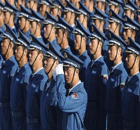Asia-Pacific
Officials: Afghan avalanches kill 166 people
(Agencies)
Updated: 2010-02-11 09:17
 |
Large Medium Small |
|
 Afghan National Army (ANA) soldiers search for bodies in the snow after avalanches killed at least 166 people in Salang tunnel in Parwan province, February 10, 2010. Afghan rescue workers searched for survivors for the third day on Wednesday in the avalanche-stricken mountain pass, fearing that dozens of people were still buried under snow. [Agencies] |
KABUL: The death toll from massive avalanches that blocked a mountain pass north of Kabul soared to 166, as hundreds more remained trapped in their snowbound vehicles, Afghan officials said Wednesday.
Afghan army troops dug through huge snowdrifts Wednesday trying to rescue people from buried vehicles in the Salang Pass, a key road that connects the Afghan capital with the north. Helicopters ferried rescuers to the scene and brought down the bodies.
Interior Ministry spokesman Zemeri Bashary said rescuers have recovered 166 bodies from the Salang Pass, 70 miles (115 kilometers) north of Kabul, over the past two days.
Some of the victims were found frozen to death inside their vehicles, while in other cases, their bodies were strewn along the road, he said.
Bashary said late Wednesday that the rescue operation was "95 percent over," suggesting authorities did not expected further significant increases in the death toll.
At a press conference in Kabul, Bashary said 1.5 miles (2.5 kilometers) of road have been cleared for ambulances, bulldozers and other road-clearing equipment to get through. About 2,600 people have been rescued so far, he said.
More than two dozen avalanches had poured tons of snow and ice on the pass, blocking off 2.1 miles (3.5 kilometers) of road and burying hundreds of vehicles. The 1.6 mile (2.6 kilometer)-long Salang Tunnel, a Soviet-built landmark dating from the 1960s through the Hindu Kush mountains, had been cut off, with dozens of cars, buses and trucks jammed inside.
Some 400 police, along with 100 local volunteers, have been involved in the frantic effort to dig out survivors in the last 24 hours, he said.
Bashary said 135 bodies have been taken to Parwan province to the north while the remainder were taken to Baglan province in the south.
Rescuers reached dozens more of the stranded this morning, including seven children whose mother had died.
Search-and-rescue teams took advantage of clear and sunny weather on the pass to retrieve more victims, said Suhrab Ali Safari, the acting minister of public works.
"Now the weather is good so we're trying to find more bodies. Most of them we found on the road under the snow," he said. "The avalanche was very strong. It pushed the cars 200 yards (meters) away from the road."
Emergency rescue workers said among the dozens of vehicles stuck in the high drifts of snow were two buses. In one bus, at least 15 people were found dead.
On Tuesday, the Defense Ministry said that Afghan forces had managed to evacuate more than 400 of the injured, with 180 taken by coalition helicopters to Bagram Airbase for medical treatment, said Defense Minister Gen. Abdul Rahim Wardak.
Some 500 Afghan soldiers were also mobilized to join the police and others in rescue efforts. The international coalition contributed four Chinook helicopters, while the army sent two choppers, several ambulances and several bulldozers, the Afghan National Army said.











